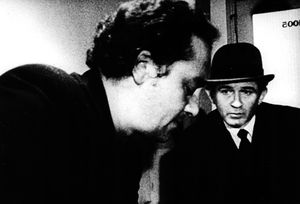Beyond the Law Remarks
Having been requested to make a few remarks about my movie Beyond The Law[1] (alias Bust 80) (alias Gibraltar, Burke and Pope) (alias Copping the Whip) alias, alias — nothing more curious to find than a title for a movie. I would prefer instead to talk about what the film is not, or not yet. It is dangerous to talk about what a movie is, or give a synopsis of its plot because that tends to circumscribe an audience’s reactions and so would spoil the sense of anticipation at a premiere. I would therefore rather mention a few flaws, lacks, and omissions in the work.

When the date of April 2 was set for the premiere, some two months ago, we had every confidence the film would be finished artistically and technologically by that date. At a certain point, perhaps by March 1, we recognized that the time required for certain necessary technological processes had been miscalculated: by April 2 we could have a film which was ready either artistically, or technologically, but could not have a picture which was ready both ways. The final cutting and trimming would in that case have had to be rushed and as you will see, this picture depends even more than most on its editing. So we chose to present for the premiere a film which was artistically as good as we could make it. But technically, it is alas not finished. It will not be finished in that way for another month. There are at present no titles at the beginning, no credits at the end, and no accompanying music (this last, an artistic lack — although not too grievous we hope). There will be also, one confusing technical process present. The picture was cut with notations for the film laboratory to insert a great many specific old-fashioned Wipes — a process where part of the new scene slowly or quickly pushes or explodes the old scene off the screen. Since this process takes weeks to print in a lab, we are forced instead to show the picture at this point with Superimpositions (both scenes are seen for an instant in double exposure) for this is the preparation we must give the lab to make Wipes. In places the Superimpositions will happen to work well. In other places, they will prove distracting.
But in this necessary substitution of Superimposition for Wipes, as well as by the absence of introductory titles, film credits, and the card which signals THE END, Beyond the Law alias Bust 80 is not complete. Artistically, however, but for the occasional bars, chords, and strokes of our missing music, it is finished as we can possibly make it, and we hope it proves to be an experience somewhat unlike anything you have ever seen before on film. It is of course not in color — none of the glorious color which enriches Bonnie and Clyde or The Graduate will serve us here.
Moreover, it was filmed in 16 millimeter by hand-held cameras in the style of Cinema Vérité, which is to say that much of the photography will be grainy, here and there ill-exposed, the image sometimes jiggly. The style of Cinema Vérité has severe critics and impassioned defenders — you will soon be able to choose for yourself.
What it loses in high focus, technical polish, and security of movement for the optic nerve, is gained back we feel by its ability to project you into the event, for the lens of Cinema Vérité, wanders, leaps, probes, and moves forward on the sly like your own eye in an unfamiliar but absorbing event, and so contributes to projecting a sense of reality on another order of intensity altogether from the average movie. It is our hope that some of you will find Beyond the Law more real than any movie you’ve ever seen — that others will be repelled can unfortunately be taken for granted. There is a language in this film unlike anything ever heard on a screen, a drawing room, or a public hall — one would have to go to a barracks or prison to find its equal. Trust the director that it was necessary. One does not work six months on a film and bring it for premiere to Notre Dame without the conviction that a page in history of the film has now some small chance to be turned.
God help us the projector does not break down or the sound track put on goggles and swim with inaudible murmurs through the ears of the audience, yes.
But enough of apology. Best wishes to you, salutations, and may you enjoy the film.